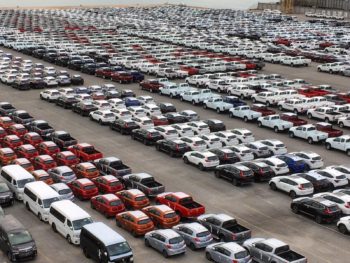Fleet sector helps drive September new car volumes
A rise in fleet registrations in September helped temper a continued decline in consumer confidence but the overall new car market remains down year to date.
Latest figures from the Society of Motor Manufacturers and Traders (SMMT) for the all-important plate change month show that September registrations were up just 1.3% compared to September 2018 – which saw low volumes as the WLTP regime kicked in – totalling 343,255 units.
Fleet registrations helped drive the market, rising 8.6% to 168,850 units, but sub-25 ‘Business’ registrations almost halved, with a 44.8% fall to 11,232 units. Private registrations were up 0.1% to 163,173 units.
For the year to date, the market is down 2.5% to 1.86 million units. Fleet registrations remained static, with a 0.1% uplift to 976,304 units while business registrations were down 37.4% to 47,889 units. Private registrations fell 2.4% to 838,978 units.
There was, however, good news when it came to registrations of alternatively fuelled vehicles. Battery electric cars saw the biggest percentage growth of all fuel types in September, up 236.4% (5,414 units) as new models boosted registrations. Plug-in hybrids (PHEVs) also saw growth for the first time in six months – albeit on the back of a 22.3% decline in the same month last year. However, diesel registrations fell 20.3% while petrols experienced a moderate increase of 4.5%.
Year-to-date PHEV registrations are now 5.2% below the same period two years ago. By comparison, popular hybrid electric and battery electric cars are up 32.4% and 125.1% on the same period.
Commenting on the figures, Mike Hawes, SMMT chief executive, said: “September’s modest growth belies the ongoing downward trend we’ve seen over the past 30 months. We expected to see a more significant increase in September, similar to those seen in France, Germany, Italy and Spain, given the negative effect WLTP had on all European markets last year. Instead, consumer confidence is being undermined by political and economic uncertainty. We need to restore stability to the market which means avoiding a ‘no deal’ Brexit and, moreover, agreeing a future relationship with the EU that avoids tariffs and barriers that could increase prices and reduce buyer choice.”
Ashley Barnett, head of consultancy at Lex Autolease, added: “The new licence plate release means September is usually a good month for registrations. It’s particularly encouraging to see pure electric car registrations showing continued growth, and this must be backed by ongoing fiscal support; plug-in hybrid registrations are down 30% year-on-year following the removal of the grant last October.
“Rather than compare month-on-month or year-on-year, looking at the data in line with the average 48-month vehicle replacement cycle arguably gives us a better indication of the strength of the market. While low and zero-emission vehicles are growing in popularity, they still account for a small percentage of the total registrations year to date, which is 11% lower than by this point in 2015.
“This means older, more polluting technology is staying on the roads, offsetting the progress that’s being made with electric vehicles, limiting the potential for fleets to feed the second-hand market with newer, cleaner models, and making the Government’s Road to Zero targets more difficult to achieve.”
Barnett urged lower-mileage users who operate in and around urban areas to start considering electric now, while also urging for wider industry help with take-up.
“Demand for electric vehicles is growing in line with increased awareness of their whole-life cost benefits, continued improvements to battery life and the ongoing rollout of charging infrastructure, but long lead times could still be an issue for many. Customers and leasing companies must work together to forecast demand ahead of time and communicate with manufacturers, so that more electric vehicles are available, sooner,” he said.













